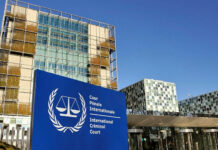
Eran Lerman
At the Cabinet meeting convened by Israeli Prime Minister Benjamin Netanyahu on Sept. 12, one week before he headed to New York to address the United Nations General Assembly and meet U.S. President Joe Biden and other world leaders, a contentious issue emerged: Should the families of Palestinian security prisoners (those convicted on terrorism charges) be allowed to visit once a month, as is the practice now, or only once every two months?
Treatment of Palestinian prisoners in Israeli jails has always been a highly sensitive matter in Palestinian society; now it also serves to illustrate a rift within Netanyahu’s coalition. His hard-right partners are pushing to worsen the prison conditions of convicted terrorists, while security professionals see no reason to tamper with an issue that may trigger Palestinians.
On Sept. 12, Netanyahu sided with the professionals and rejected the hard right position, putting off any action until a further Cabinet discussion in October. But as the next crisis — over the delivery of a few armored vehicles to the Palestinian security forces — soon revealed, tensions within the government remain unresolved.
The ruling center-right in Israel takes a “conflict management” approach to the Palestinian issue. They prefer to leave open the prospect that a resolution of the Israeli-Palestinian conflict may yet be possible one day, as the region changes and new leaders emerge. But until then, they believe, what Israel should do is ease tensions and improve living conditions for Palestinians in the West Bank and Gaza, while reserving the right to hit back at terrorist activity.
This leaves in place the framework created by the Oslo process and requires the Israel Defense Forces and the Israel Security Agency (Shin Bet) to work with the American-trained Palestinian security services against the more radical groups. This approach is supported by elements within the Likud Party, including Defense Minister Yoav Gallant and Intelligence Minister Gila Gamliel, Aryeh Deri and the Shas Party, security and legal professionals (derided as the “Deep State”), and also often by the centrist opposition parties.
In line with this approach, Netanyahu authorized the establishment, in early 2023, of the “Aqabah forum,” a regular meeting of senior security officers from the Palestinian Authority, Israel, Jordan, Egypt and the United States. Israeli National Security Adviser Tzahi Hanegbi recently asserted not only the importance of this group but also revealed that he is in direct dialogue with the Palestinians over the proposed Israeli-Saudi normalization deal.
But within the coalition government are two parties opposed to the conflict management approach: the Otzma Yehudit Party of National Security Minister Itamar Ben-Gvir and Religious Zionism Party of Finance Minister Bezalel Smotrich, who together hold 14 of the coalition’s 64 seats, thus granting Netanyahu and his Likud Party a narrow majority of the 120-seat Knesset. Moreover, influential members of the prime minister’s own Likud Party hold similar views. They seek a decisive “victory” over and a breaking of the Palestinian national movement. This would in their vision lead to Israeli sovereign rule over the West Bank.
Possible gestures to the Palestinians
This rift within the Netanyahu coalition is now being studied in detail in the context of American efforts to broker an Israeli-Saudi normalization deal. Netanyahu dedicated the core of his General Assembly speech to the assertion that such a breakthrough may well be just around the corner. But as President Biden indicated in his own U.N. speech, such a deal would require significant Israeli concessions to the Palestinians.
From a center-right Israeli perspective, what would be on the table is not in the realm of conflict resolution. Israel is not about to withdraw from territory or remove settlements in the West Bank. What is at stake at this stage is better conflict management, as some of the key people in Netanyahu’s inner circle attest. Even the coalition’s hard right would likely acquiesce to some more money (preferably Saudi) flowing to the Palestinian Authority and several major infrastructure projects being built, and perhaps arrangements would finally be made for production at the Gaza Marine offshore gas field.
There are other symbolic measures that the hard right would resist — such as the reopening of the PLO representation in Washington. (Both the Israeli government and centrist opposition would continue to oppose the reopening of a Palestinian-oriented U.S. consulate in Jerusalem.) Most significantly, the coalition would resist any limitations on adding new settlements or enlarging existing ones, as discussed in meetings at Aqabah and in Sharm el-Sheikh earlier this year.
One positive sign comes not from the Israeli but from the Palestinian side: Unlike their petulant response to the Trump administration’s economic “workshop” in Bahrain in 2020, the Palestinian Authority chose to engage this time — with the Saudis, with American officials and even with Israel — and to seek some realistic “give” that the Saudis would pose as a requirement to legitimize a future breakthrough in the eyes of their own people and the Arab world.
Three possible scenarios
In the first, Netanyahu would cave to the pressure of his far-right coalition partners and elements of his own base in Likud and reject any significant concessions to the Palestinians. If this were to happen, he will probably keep his coalition intact; there is no prospect of Likud moderates actually bringing down the government. But the broader consequences for Israeli policy could be dire: tensions with the Palestinians would escalate; internal cohesion inside Israel — where large constituencies support negotiations leading to a two-state solution—would fray further; Israel’s international standing, including with existing Arab partners, would drop. Most importantly, relations with America would deteriorate at a time when America is needed to confront the Iranian nuclear challenge.
A second prospect would be for the centrist opposition parties to join the Netanyahu government and allow it to maintain a parliamentary majority, as Ben-Gvir and Smotrich walk. The most likely candidate for such a joint government is Benny Gantz and his National Unity Party. Yesh Atid leader Yair Lapid is a less likely prospect.
This scenario would give the IDF and Shin Bet broad backing for their stabilization efforts, remove Israeli obstacles to a Saudi deal and mend fences with America. But it would be an agonizing decision, both for the opposition, which has felt betrayed by Netanyahu in prior governments and for the Likud, which would have to jettison a core issue. Meanwhile, the Biden administration is already meddling in Israeli internal politics.
A third scenario would be for Netanyahu to gamble and opt to dissolve the government and call for early elections, sometime in the first half of 2024. The ostensible reason to do so would be the anticipated broad popular support for “peace with Saudi Arabia” — much ballyhooed in the Israeli press but without concrete details from either Saudi Arabia or the United States.
Which scenario will be realized? With too many unknowns at play, it is not easy to predict which way Netanyahu will jump. The main themes facing him and his government are clear — compromise over judicial reform, the need for some action on the Palestinian front to enable a Saudi deal, and increasing concerns over the range of threats from Iran.
Eran Lerman, the former deputy director of the National Security Council, is the vice president of the Jerusalem Institute for Strategic Studies. This was originally published by the Jerusalem Strategic Tribune.







Mr. Lerman ignores the fact that Article 80 of the United Nations Charter, an international treaty, which incorporates by reference the 1922 Palestine Mandate and the 1920 San Remo agreement, declares all of what is Israel to be the reconstituted homeland of the Jewish people. Thus, Israel is an ethnic democracy not a liberal democracy whose Jewish aspirations are embraced by the United Nations Charter and the U.N. members who are required to obey it.